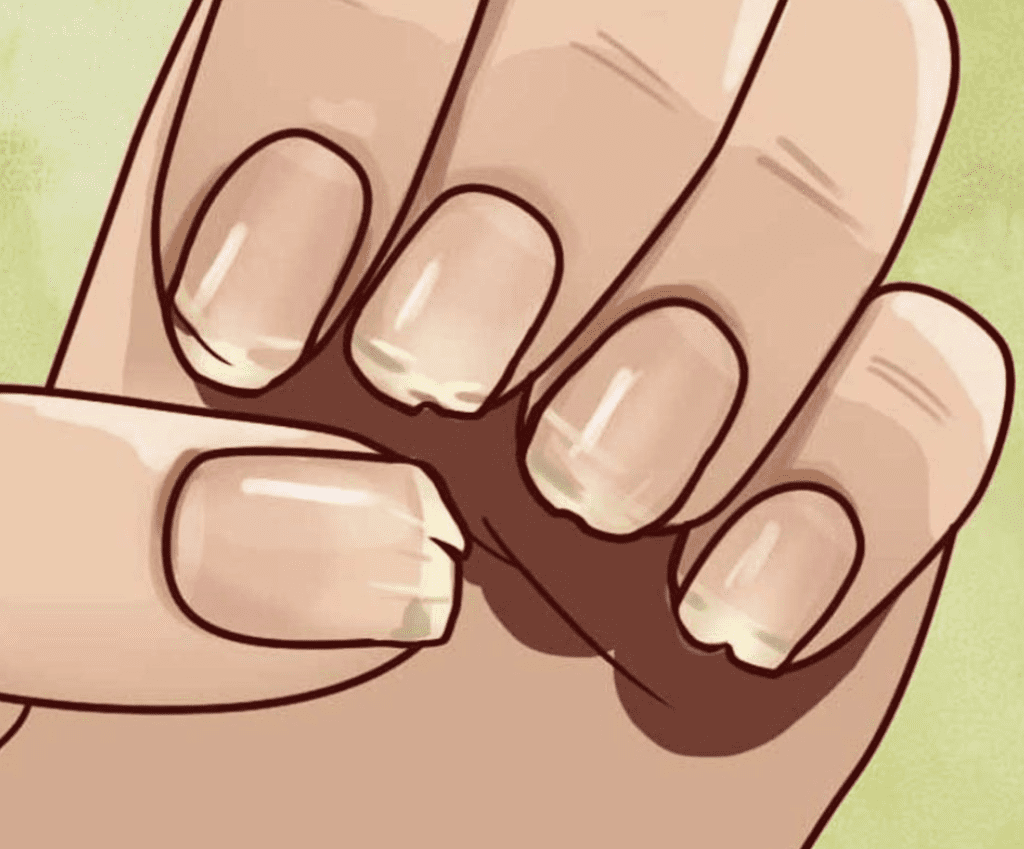Healthy, robust nails are more than just an aesthetic feature—they’re a window into your overall health. When nails frequently split, break, or display unusual symptoms, they might be signaling nutritional deficiencies or underlying health issues. By understanding these signs, you can not only improve the appearance of your nails but also address potential health concerns before they escalate.

In this comprehensive guide, we’ll explore the various reasons why nails may become weak or brittle and what your body might be trying to communicate through these changes. From dietary impacts to environmental factors and serious health conditions, this article will provide you with the insights needed to maintain beautiful nails and a healthier body.
1. Nutritional Deficiencies: The Building Blocks of Nail Health
Lack of Biotin
Biotin, also known as vitamin B7, is essential for the health of your hair, skin, and nails. A deficiency in biotin can lead to brittle nails that are prone to splitting and breaking. Biotin plays a crucial role in the production of keratin, the protein that makes up your nails. If your nails are weak, incorporating more biotin-rich foods into your diet can help. Foods such as eggs, almonds, cauliflower, cheeses, mushrooms, sweet potatoes, and spinach are excellent sources of biotin and can strengthen your nails from the inside out.
Iron Deficiency
Iron is vital for the production of hemoglobin, the protein in red blood cells that carries oxygen throughout your body. This oxygen is crucial for nail growth and health. When your body lacks iron, your nails may become brittle, thin, and oddly shaped, often with a concave or spoon-like appearance. To combat this, include more iron-rich foods in your diet, such as spinach, red meat, lentils, and fortified cereals. If dietary changes aren’t enough, consider consulting with a healthcare provider about iron supplements.
Insufficient Protein Intake
Keratin, the primary component of nails, is a type of protein. A diet lacking in sufficient protein can weaken the structure of your nails, making them more susceptible to damage and breakage. Ensuring adequate protein intake is essential for maintaining strong nails. Lean meats, poultry, fish, legumes, and dairy products are excellent sources of protein that can help reinforce your nails and prevent brittleness.
2. Hydration: The Key to Nail Flexibility and Strength
The Impact of Dehydration on Nails
Dehydration doesn’t just affect your skin and overall energy levels—it also has a significant impact on your nails. When your body is dehydrated, your nails can become dry, brittle, and prone to splitting. Drinking plenty of water throughout the day helps maintain the flexibility and strength of your nails. Additionally, using moisturizing hand creams and cuticle oils can provide an extra layer of hydration, protecting your nails from environmental damage.
3. Environmental Factors: Protecting Your Nails from External Damage
Chemical Exposure
Regular exposure to harsh chemicals, including cleaning agents, nail polish removers, and detergents, can weaken your nails over time. These chemicals strip the natural oils from your nails, leading to brittleness and breakage. To protect your nails, wear gloves while cleaning and opt for acetone-free nail polish removers. Additionally, consider using natural cleaning products that are gentler on your nails and skin.
Weather Conditions
Extreme weather conditions, particularly cold and dry climates, can also take a toll on your nails. Cold air and indoor heating can strip moisture from your nails, making them more prone to breaking. To combat this, use a good moisturizer and wear gloves during colder months to protect your nails from the harsh elements. Applying a hydrating nail and cuticle oil regularly can also help maintain moisture levels.
4. Health Conditions: When Nails Reflect More Serious Issues
Thyroid Diseases

Thyroid diseases, such as hyperthyroidism and hypothyroidism, can lead to brittle nails. The thyroid gland regulates many of the body’s metabolic processes, including nail growth. When the thyroid is underactive or overactive, it can cause changes in the texture and strength of your nails. If you suspect a thyroid issue, a simple blood test can diagnose the condition, and appropriate treatment can help restore nail health.
Psoriasis
Psoriasis is a chronic skin condition that can extend to the nails, causing pitting, abnormal nail growth, and splitting. This can be a challenging condition to manage, but treating the underlying psoriasis often improves nail health. Topical treatments, light therapy, and systemic medications can all be effective in managing nail psoriasis.
Fungal Infections
Fungal infections are another common cause of brittle and discolored nails. These infections can damage the nail bed and cause the nails to become thick, brittle, and prone to breaking. Over-the-counter antifungal treatments can be effective, but in more severe cases, prescription medications may be necessary to resolve the infection and restore nail health.
5. Physical Stress: The Role of Trauma in Nail Health
Repeated Trauma
Using your nails as tools—whether to open packages, scrape off labels, or any other task—can cause both immediate and long-term damage. Repeated physical trauma weakens the nails, leading to splits, breaks, and even infections. To prevent this, keep your nails trimmed and avoid using them inappropriately. Consider carrying a small tool, like a pocketknife or key, to handle tasks that might otherwise harm your nails.
6. Age-Related Changes: Embracing the Natural Process
The Effects of Aging on Nails

As we age, our nails naturally become drier and more brittle. This is a normal part of the aging process, but there are steps you can take to mitigate these effects. Incorporating more omega-3 fatty acids into your diet, through foods like salmon, walnuts, and flaxseeds, can help keep your nails hydrated and flexible. Regularly moisturizing your nails and cuticles can also slow down the brittleness associated with aging.
Conclusion: Listening to Your Nails for Better Health
Your nails are more than just a cosmetic feature—they’re a reflection of your overall health. By paying attention to the signs they give, you can address nutritional deficiencies, protect against environmental damage, stay hydrated, and seek treatment for underlying health conditions. This holistic approach to nail care not only enhances the appearance of your nails but also contributes to your overall well-being.
If you’re concerned about persistent issues with your nails, it’s wise to consult with a healthcare provider or dermatologist. They can help you explore deeper health insights and find solutions that go beyond surface-level treatments, ensuring both your nails and your body are in the best possible condition.


